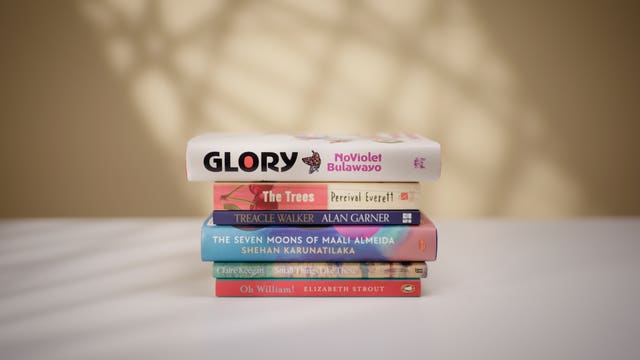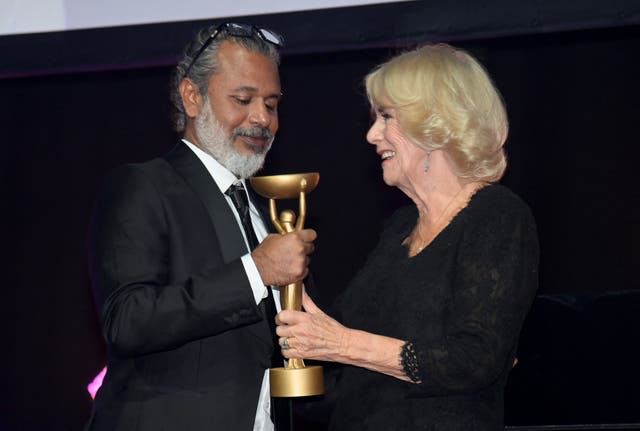Sri Lankan author Shehan Karunatilaka wins Booker Prize
The 47-year-old follows Sri Lankan-born Michael Ondaatje who won the prize in 1992 for The English Patient.

Sri Lankan author Shehan Karunatilaka has won the 2022 Booker Prize with his novel The Seven Moons Of Maali Almeida.
The writer was praised by judges for the “scope and the skill, the daring, the audacity and hilarity” of his second novel.
The book, published by the independent press Sort of Books, is a darkly comic murder mystery set in Colombo in 1990 during the Sri Lankan Civil War.
Accepting the prize, Karunatilaka praised the “spectacular” shortlist and said it had been “an honour and a privilege” to be nominated.
“I’m fans of all your books and fans of you,” he said.
“And without meaning to sound trite, we are all winners for being part of this magnificent shortlist, though, perhaps I might pocket the extra cash if that’s OK?”
He thanked his publishers for taking on his “weird and difficult and strange” book and his first-time readers for putting up with “so many messy, horrible drafts”.
Karunatilaka added: “My hope for Seven Moons is this; that in the not-too-distant future, 10 years, as long as it takes, SriLanka… has understood that these ideas of corruption and race baiting and cronyism have not worked and will never work.
“I hope it’s in print in 10 years but if it is, I hope it’s written in (a) Sri Lanka that learns from its stories, and that Seven Moons will be in the fantasy section of the bookshop… next to the dragons, the unicorns (and) will not be mistaken for realism or political satire.”
Karunatilaka, who was born in Galle and grew up in Colombo, has said that Sri Lankans “specialise in gallows humour and make jokes in the face of crises”.
“It’s our coping mechanism,” he said.
“To make any longlist requires luck … to have a novel about Sri Lanka’s chaotic past come out just when the world is watching Sri Lanka’s chaotic present also requires an alignment of dark forces.
“Unlike my protagonist Maali Almeida, I don’t gamble. So I don’t expect to roll two more sixes, though I will scream with joy if I do.”

The 47-year-old follows fellow Sri Lankan-born author Michael Ondaatje who won the Booker in 1992 for The English Patient, and the Golden Booker celebrating 50 years of the prize in 2018.
British art historian Neil MacGregor, chairman of the 2022 judges, described Karunatilaka’s book as “an afterlife noir that dissolves the boundaries not just of different genres, but of life and death, body and spirit, east and west”.
“It’s a book that takes the author on a rollercoaster journey through life and death, right to what the author describes as the dark heart of the world and there the reader finds to their surprise joy, tenderness, love and loyalty,” he said.
As well as MacGregor, the judging panel comprised academic and broadcaster Shahidha Bari, historian Helen Castor, novelist and critic M John Harrison and novelist, poet and professor Alain Mabanckou.

He was also presented with £50,000 by last year’s winner Damon Galgut, as well as a designer-bound edition of his book.
£2,500 was given to each shortlisted author. They were NoViolet Bulawayo for Glory, Percival Everett for The Trees, Claire Keegan for Small Things Like These, Elizabeth Strout for Oh William!, and Alan Garner for Treacle Walker.
Strout was unable to attend the ceremony due to illness, and Garner attended virtually from Cheshire, where he was celebrating his 88th birthday.
MacGregor added that when reading the final books, “it became clear, although they seemed originally very diverse, ranging from civil war in Sri Lanka to the private fantasy of a Cheshire childhood, they were all really about one question.
“That is, ‘what is the importance of an individual life?'”
He said that “what is striking in all of them is the weight of history” which mirrors our turbulent times.
“There are moments of great instability everywhere where structures are in question,” he added.
“What all these books reaffirm … is the importance of long time and we need to think about that.”
Karunatilaka was also given special help to allow him to travel to the award ceremony in London, something the Booker has done previously.

Dua Lipa credited Ismail Kadare, who won the inaugural International Booker Prize, for testing her language skills “while also helping me connect with my family’s heritage and identity as Kosovan Albanians”.
She added: “I often wonder if authors realise just how many gifts they give us.
“Touring commitments take me all over the globe and life is often hectic.
“Sometimes, just to survive, I need to adopt a tough exterior. And at these times, it is books that soften me.”
Lipa later led audiences in a rendition of Happy Birthday for Garner.
When asked if Dua Lipa’s appearance was trying to reach out to younger audiences, Gaby Wood, director of the Booker Prize Foundation, said: “Our sense is that the Booker Prize is a living thing and … you need to make sure and try to make sure people think it’s for them.”
MacGregor and the other judges will explore the novels further in Imagined World, which will air on Tuesday on BBC Radio 4 at 4pm.
South African novelist Galgut, 57, won the 2021 Booker Prize for Fiction with The Promise.
First awarded in 1969, the Booker is open to writers of any nationality whose work is written in English and published in the UK or Ireland.





